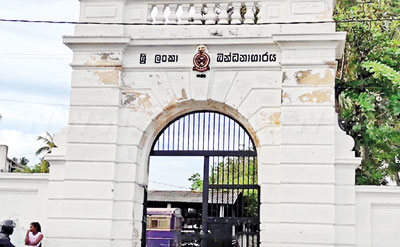News
Spotlight on prison overcrowding once again as Meningitis kills inmate
View(s):- n Activists say overcrowding further compounded by Yukthiya operation
- n Prisons Department’s Annual Report – 2023 also highlights overcrowding as a major challenge
By Sandun Jayawardana
The recent death of a prison inmate from Meningitis at the Galle Prison has again drawn attention to the risk of dangerous infectious diseases spreading through the prison population.
The Department of Prisons said on July 15 that one inmate at the Galle Prison who had passed away was confirmed to have died from Meningitis following a post-mortem examination. Three others suspected to have contracted the disease were hospitalised. The Department of Prisons accordingly started distributing antibiotics as per health sector recommendations and restricted activities at the Prison for one week to control the spread of the disease within the premises. These restrictions were lifted last Monday (22) and no further cases of the illness have been reported, Prisons Commissioner and Spokesman Gamini B. Dissanayake told the Sunday Times.

Activities at the Galle Prison were restricted following the death of an inmate
This is not the first outbreak of Meningitis at the Galle Prison this year. An inmate died from the disease in January, leading to restriction of activates in the premises. Several deadly outbreaks of infectious diseases have also been reported at various prisons in the recent past. Two prisoners died and 17 others were hospitalised following an outbreak of Meningitis at the Matara Prison in December last year while one more inmate succumbed to another outbreak at the same prison in May this year.
Activists have often highlighted the issue of overcrowding due to the large number of remand prisoners as a major factor that leads to such outbreaks. The Prisons Department’s Annual Report – 2023, which was presented to Parliament earlier this month, also highlights overcrowding as a major challenge. As per the prison statistical report 2023, there are only 10,395 prisoners who can be detained as a total detention. “Therefore, 265.14% of overcrowding is shown in the whole prison system due to the existing remand population related to the daily median of prison inmates.”
The report adds that most remand prisons are old and established close to urban courts. Hence, there is not enough space to expand the premises. “Therefore, provision of accommodation facilities with minimum standard and necessary sanitary facilities according to inmate population is a huge challenge faced by the Department of Prisons.”
Activists have claimed the large number of arrests made since the beginning of the ‘Yukthiya’ operation last December has led to a significant increase in the number of remand prisoners, compounding the already serious issue of overcrowding.
The number of inmates in the country’s prisons has reduced from a peak of about 33, 000 in January this year to just below 30, 000 now, the Prisons Spokesman said. Several presidential pardons such as those given for Independence Day, Vesak and Poson have also contributed to a reduction in the number of inmates since January. He added that it is difficult to conclusively say that the ‘Yukthiya’ operation has led to a worsening of the overcrowding problem since the Department of Prisons does not get statistics of the specific operations that lead to inmates’ arrest. “But it may well be having an impact,” he acknowledged.
The country’s prisons have three times more inmates than they are designed to hold owing to the large number of remand prisoners, said Senaka Perera, President of the Committee for Protecting Rights of Prisoners (CPRP). As a result, prisoners are being held in appalling conditions with minimum facilities and the mass arrests made during the ‘Yukthiya’ operation have only worsened the situation, he alleged. Mr Perera said the CPRP has received reports that the situation had become so bad that in some prisons, inmates were even being housed in areas set aside for religious worship. “The Department of Prisons has three stated principles – Custody, Care and Correction. Taking steps to ensure prisoners are protected from infectious diseases is one aspect of the ‘Care’ part, yet clearly this is not happening.”
He pointed out that the facilities afforded for prisoners have not improved to keep pace with the large number of prisoners. Prison officers and their families are also at risk of contracting infectious diseases that spread through the prison population. Additionally, such outbreaks lead to court cases having to be postponed, leading to a delay in the administration of justice. Mr Perera noted the CRCP has brought this to the notice of authorities including the Human Rights Commission (HRC).
The best way to say that you found the home of your dreams is by finding it on Hitad.lk. We have listings for apartments for sale or rent in Sri Lanka, no matter what locale you're looking for! Whether you live in Colombo, Galle, Kandy, Matara, Jaffna and more - we've got them all!

